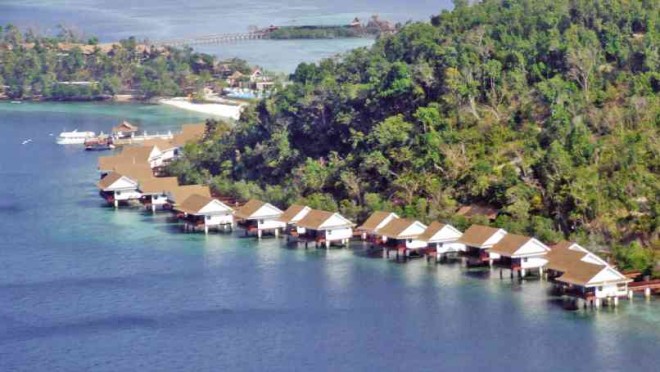
COTTAGES dot the shoreline of Naglayan Island, belonging to Sunlight International which has come under scrutiny for operating a resort in the area without permits. Illegal wood had been found in the resort during a recent raid. REDEMPTO ANDA/ INQUIRER SOUTHERN LUZON
CULION, Palawan—A Chinese resort developer is in hot water over its spurious claim of ownership to an island here that his company developed into a high-end resort without permits.
It is also facing criminal and administrative charges for illegal logging and other environmental cases.
The Department of Environment and Natural Resources (DENR) said it would seek to revoke a land title presented by the resort owner, a certain Giok EH Sy Brito who also goes by a local name, Giok Brito, to prove ownership of the property on Naglayan Island.
Fake land title
The resort, known as Sunlight Eco Tourism Island Resort and managed by Sunlight International Island Resort Inc., is facing closure after it was raided last week by provincial government enforcers for possession of illegal wood. Its site manager was detained.
The company has not replied to e-mail inquiries from the Inquirer and did not reply to private messages in its social networking sites.
Sunlight International also operates a hotel in downtown Puerto Princesa City and a chain of Unitop Malls around the country.
Chinese businessmen in Palawan described the company’s owner as “not a participant in local business circles.”
On Tuesday, the provincial environment and natural resources officer, Juan dela Cruz, said the land title and other documents submitted to his office by the company “were dubious.”
“We are digging up the LRA (Land Registration Authority) records, but we are doubtful of the authenticity of their alleged land title,” Dela Cruz told the Inquirer.
The company claimed the island was bought by its current owner, Giok Brito, from the government on Feb. 15, 1972 through an agricultural sales patent. In December 2013, it was able to obtain two transfer certificate titles for the 18-hectare island.
Investigators doubt the authenticity of the company’s ownership documents, noting that in 1972, when a supposedly young Brito bought the island from the government, it was still a leprosy facility ran by the Department of Health.
While Brito claims he had already bought the land in 1972 and obtained two titles for it two years ago, Dela Cruz insisted that the island is still government property as part of “unclassified public forest.”
“Who in his right mind would buy an island from the government in a leper colony, thinking of developing it into a resort 40 years later?” a local resort owner said.
Collusion
The provincial government is also investigating the alleged collusion of local officials with the company, the main reason it was able to acquire large volumes of illegal wood and quarry materials during the resort’s construction.
“The provincial government will not countenance these shortcuts, much as it is encouraging tourism investments. The governor wants to make sure that investors do it legally and by the book,” provincial legal officer Teodoro Jose Matta said.
Documents obtained by the Inquirer showed that the company had in its possession a strategic environmental plan clearance issued by then Gov. Joel T. Reyes, a special permit issued by the Palawan Council for Sustainable Development (PCSD). PCSD officials records, however, did not indicate such a permit was issued to the company.
Reyes and his brother, former Coron Mayor Mario Reyes, have gone into hiding since 2013 after they were were tagged as masterminds in the murder of Palawan radio broadcaster and environmentalist Dr. Gerry
Ortega.
Local witnesses
Several witnesses are ready to testify in court on the environmental crimes allegedly committed by the company, according to Matta.
Apart from amassing huge volumes of banned hardwood, the company reportedly created artificial white sand beaches on the island, which was originally dominated by mangroves and sea grass.
“There were no white sand beaches in that island before,” a local resident told the Inquirer. He asked not to be named, claiming that local politicians were involved in supplying the illegal wood and sand materials.

